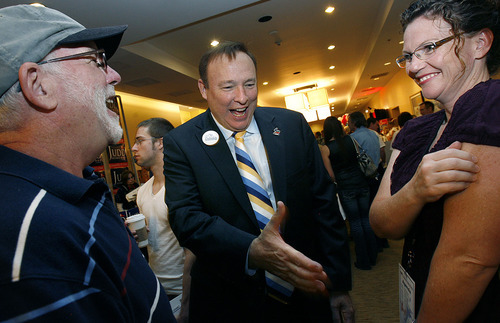This is an archived article that was published on sltrib.com in 2011, and information in the article may be outdated. It is provided only for personal research purposes and may not be reprinted.
When former state senator and U.S. Senate candidate Scott Howell heard that Jim Dabakis was planning to run for Utah Democratic Party chairman, he went to officials of his LDS Church, hoping they would be comfortable with the idea of an openly gay man leading Howell's party in Utah.
They were.
Dabakis, along with Sen. Ben McAdams, D-Salt Lake City, had worked before with LDS officials to get the church on board with Salt Lake City's anti-discrimination ordinance, which protects the rights of gays and lesbians in housing and employment issues. McAdams, an active Mormon, is also a top official in Mayor Ralph Becker's administration, which initiated the ordinance.
Conservatives in the Utah Legislature at first planned to introduce a bill that would override the local ordinance, but backed off when they learned the LDS Church did not oppose it.
Now Dabakis, elected Saturday as the first gay man to lead a major political party in Utah, already has begun a formal effort to bring the Democratic Party and the Mormon community closer together.
He put together a meeting recently, before he was elected chairman, at the home of Sam and Diane Stewart, who are active LDS, with about 30 prominent Mormon Democrats attending. Their aim is to change the perception that Democratic and Mormon values are not compatible. Besides McAdams and Howell, the meeting was attended by Rep. Brian King, former Rep. Trisha Beck and Don Jarvis, an unsuccessful legislative candidate in Provo who is a former LDS mission president.
"We call ourselves the big-tent party, that everyone is welcome," said Dabakis. "But in the past, it has seemed that everyone is welcome in our big tent except Mormons."
Howell and other Democratic legislators have said in the past that they would get teasing in their Mormon wards about being Democrats, but they were also not trusted by many of their Democratic colleagues because they were Mormons.
"I used to meet with [former LDS president] Gordon B. Hinckley and [former apostle] Neal A. Maxwell, and they would encourage me to recruit good people as Democratic candidates," Howell said. "They wanted a healthy two-party system."
Howell was transferred to California after he lost the Senate race to Orrin Hatch in 2000. When he returned to Utah, he recalls, "I was appalled at how the right wing has hijacked my faith in this state." He believes there is a disconnect between what the right-wing faction of the GOP is espousing and what rank-and-file Mormons really believe.
"In my three terms in the state Senate, I don't remember an LDS leader ever coming to a bill-signing ceremony," Howell said. Presiding Bishop H. David Burton attended the signing of the illegal immigration bills that include a guest-worker program that state Republican delegates voted in their convention to repeal.
That is why Dabakis is optimistic that the Democratic Party has a message that can resonate with the LDS faithful. "On 90 percent of the issues, we're on common ground, he said, adding that sometimes Democrats inadvertently sent messages that were antithetical to Mormon sensibilities."
Howell cited a recent BYU/University of Pennsylvania study that showed red-state Utahns and blue-state New Yorkers shared the same views on social issues 77 percent of the time and on economic issues 69 percent of the time.
Yet surveys have shown that the LDS faith has the largest percentage of members who identify with the Republican Party of any religious group.
Dabakis said a priority of his term as chairman will be to embrace the LDS community and make Mormons feel comfortable in the Democratic fold.
But now that he has launched the idea, he said he is turning the effort over to the Mormon Democrats. McAdams will be the leader.
facebook.com/paulrolly



